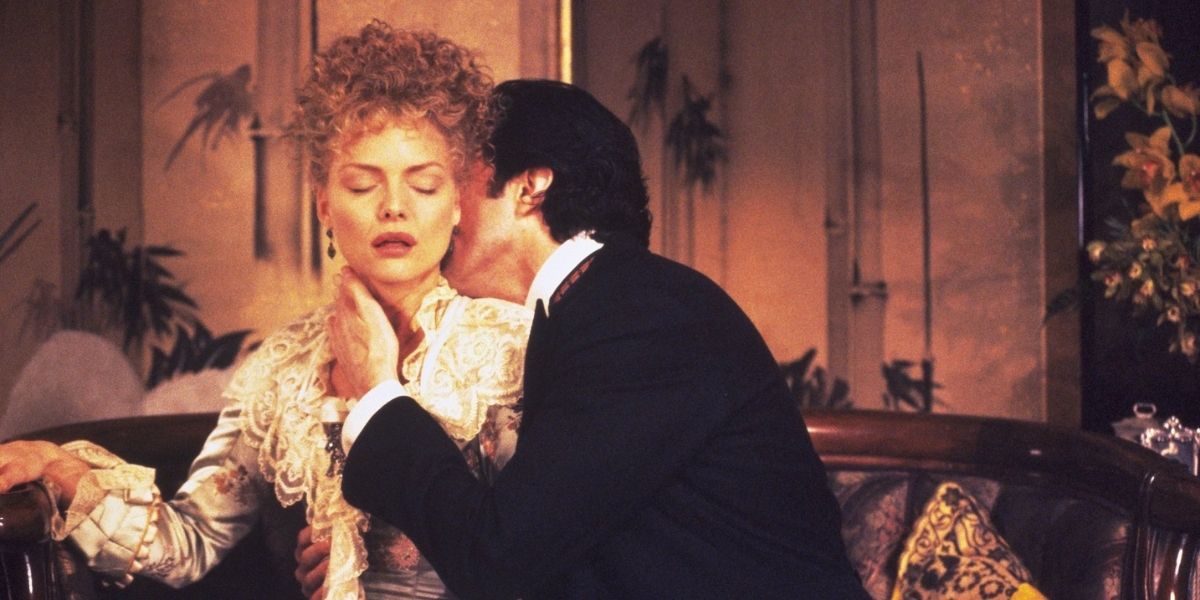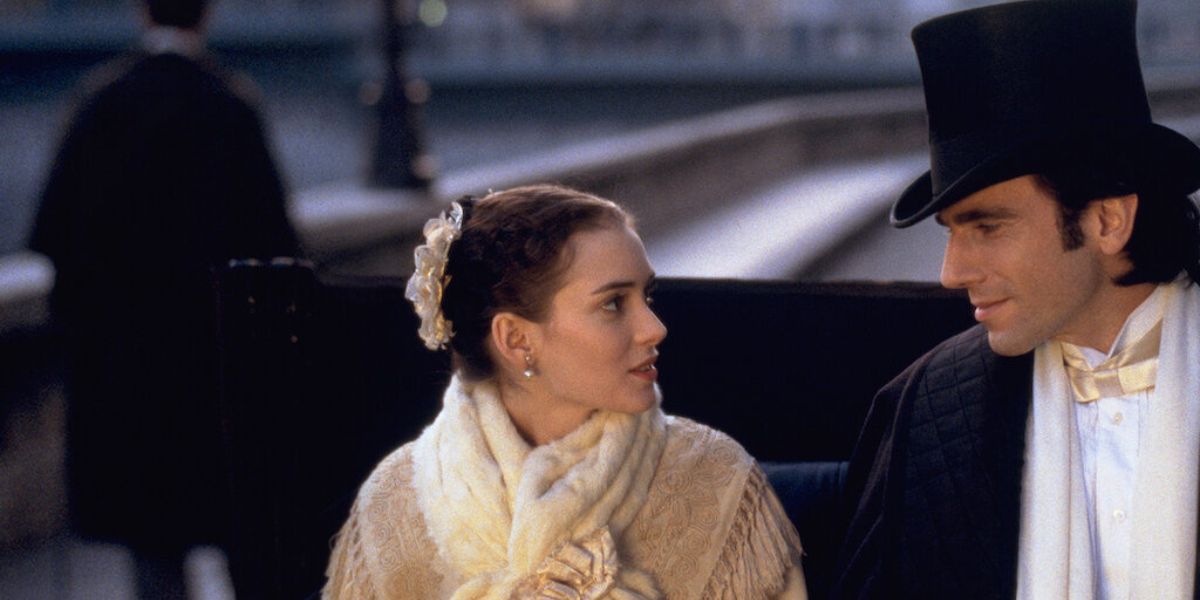When conversations about violence in the filmography of the great Martin Scorsese take place, his adaptation of the Edith Wharton Novel, The Age of Innocence, is the last piece that would ever come to mind. One would easily surmise that his mob flicks such as Mean Streets, Goodfellas, or Casino would be the center of the discussion, but they would be gravely mistaken. This seemingly bland story of individuals placed up high in the totem poles of New York society represents true pain, the devastation of which is insurmountable compared to mere guns and ammunition. Here, the agony is emotional, like a knife slowly piercing through the body until flesh is met with the hilt of the blade. As the film would eventually show, a setting where a miniscule mistake in refinement is heavily frowned upon would incur catastrophic consequences if one wants to go against the grain.
The film tells the story of Newland Archer (Daniel Day-Lewis), a lawyer who is engaged to be married to May Welland (Winona Ryder), a pure and respected member of society. In the middle of their planning, May’s cousin, Countess Ellen Olenska (Michelle Pfeiffer) returns to New York after she left her husband, a Polish Count. Olenska’s arrival immediately stirs gossip among the noble circles, but Archer is smitten with her, fascinated by the mere presence of difference. Living in a world that was unashamed in hiding their insecurities and first-world problems behind a curtain of grandeur and splendor, Archer’s fondness for a woman from the other side of the world doesn’t seem to be that far off from materializing.
Disrupting the Stability
Scorsese’s period piece is full of high-class snobbishness, filled with so many unwritten rules that merely acting human would result in a disruption of the balance. When any of the characters try to do anything that remotely resembles the human spirit, this stability crumbles and completely startles those participating in this shrewd established order. For instance, when Countess Olenska and Julius Beaufort arrive at Manson Mingott’s home in the middle of Newland and May’s betrothal visit to her, a change in the atmosphere could subtly be felt. It is as if one of your guests has brought an unwelcome friend to a party. Later, it’s confirmed in a bit of gossip about how Olenska shouldn’t be seen with another man in the midst of her separation with her husband. How simply being accompanied by an acquaintance in the busy hours of the day would be perceived as nearing adultery explains the painstaking grip pretentiousness has on high society. Entangled in this conventionality of things, the unorthodox actions of Olenska become more pronounced for Archer, and brings him to think about her more and more each day. It is curiosity and mere intrigue to the majority, but for these ostentatious people, it’s like a grenade was thrown into their room filled with trinkets and figurines.
As he slowly becomes more attracted to Olenska, Archer comes to the countess’ aid, helping her stage a comeback to society amidst the swirling rumors of her infidelity. In the process, he inevitably falls in love with a woman who they would dismiss as unworthy of their rigidity masquerading as decorum. Olenska intends to divorce her husband, and the now confused Archer agrees with her desire to be free of the shackles, but characteristic of his family’s upbringing, eventually urges her to stay married. It is here in this push and pull motion that sends Archer into a frenzy of emotions. This marks the beginning of what characteristically would be a bloody shootout in any other movie centering around violence, but Scorsese’s signature brand of bloodshed is completely reversed, with the “hits” taking the form of subtle jabs, inconspicuous quotes of dialogue, and the mere blank stares of its characters.
Brutality through Poignancy
When Newland visits May on vacation in Florida, he instinctively asks her to shorten their engagement. May suspects that something is going on, and asks if this is a result of him being afraid of marrying the wrong person, to which Archer denies. Of course, the viewers know that this is the truth, and Archer pulls just enough to convince her for the meantime, but not enough to rid her completely of doubt. The seeds of the rose of hurt have been planted, and the growth of what’s to come need only time before they can unleash their thorns. It is in the presence of these moments of subtle questioning where the brooding sting of discovery builds up, and Scorsese masterfully milks every bit of traction from the two leading characters. Upon his return to New York, Archer releases his emotions and passionately confesses his love for the countess, only to be met with blame for her choice to not meddle in the upcoming marriage. More than an image of two people who love each other at a time when they could not, the confession is a blow-up of fervent emotions, which tears the heart out of the viewers. It is tragic and ruinous, the news of which could completely destroy the reputation of a squeaky clean nobleman and his family. What could be more violent than realizing you have discovered true romance when you have already been engaged to someone you could not afford to hurt as well?
The aftermath of Newland and May’s wedding poured on the rain of brutal moments. As expected, the countess was not able to come to their wedding, and May chose their honeymoon venue to be the van der Luyden’s cottage in one of their properties, the house which the countess mentioned as “the only house in America where she could imagine being perfectly happy.” Consummating their love in a house that was the dream of his heart’s true choice is a gut-wrenching experience, the thoughts of which would continue to linger as the days go by. While the violence in gunfights end abruptly, the sheer cruelty of a broken heart in a world that asks one to pretend is pure cruelty. When Mrs. Mingott’s sickness brings about the return of Olenska to take care of her, the suffering reaches its apex and explodes in a sequence of mayhem concealed by fake smiles amidst the pomp and circumstance of Olenska’s farewell dinner.
In perhaps the most agonizing scene of the film, Newland Archer discovers, through mere feeling, that everyone in the ranks of society knows about his love for the countess, even his own wife. All of their eyes were silently watching, but were loftily pre-occupied with participating in the events of the dinner. In the middle of this realization, May sees her husband and appears to torment him by cutting of her conversation with the countess, and approaches Newland. In her face was a cunning smile that tucked away a myriad of resentment. When his desperate offer to take Olenska to her carriage is met with rejection, it releases the ache of a hundred bullets. A heartbreak felt around the world, resonating outside the confines of the silver screen. The film’s conclusion, where we see Newland as an old man staring into Olenska’s window with a glimmer of hope only to be struck with the agonizing winds of reality, acts as the coffin nails for this “scandalous” affair. There is no greater sorrow than to live old and wallow in the regret of one’s choices.
It is not Travis Bickle’s revenge in Taxi Driver, nor the punches of Jake LaMotta in Raging Bull, nor the savagery of “The Butcher” in Gangs of New York that carries the bloodiest moment in Scorsese’s creations. It is the shattering of a New York Llawyer’s hopes and dreams in The Age of Innocence that brings the most devastating feelings, woefully increasing in its pain the more you look at it.
This content was originally published here.











